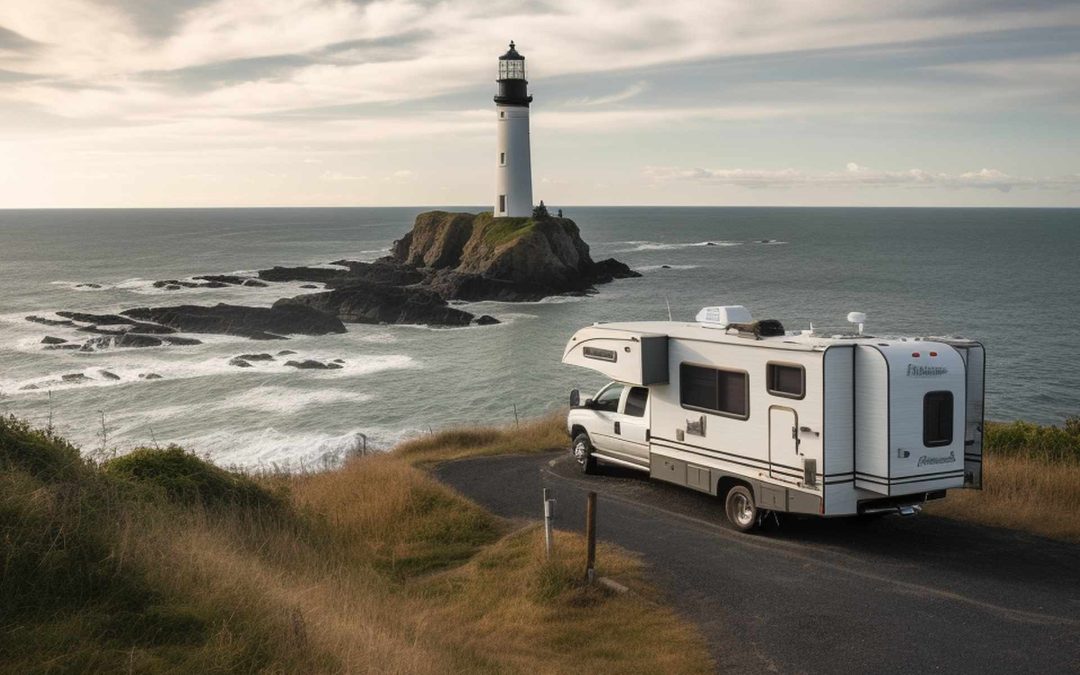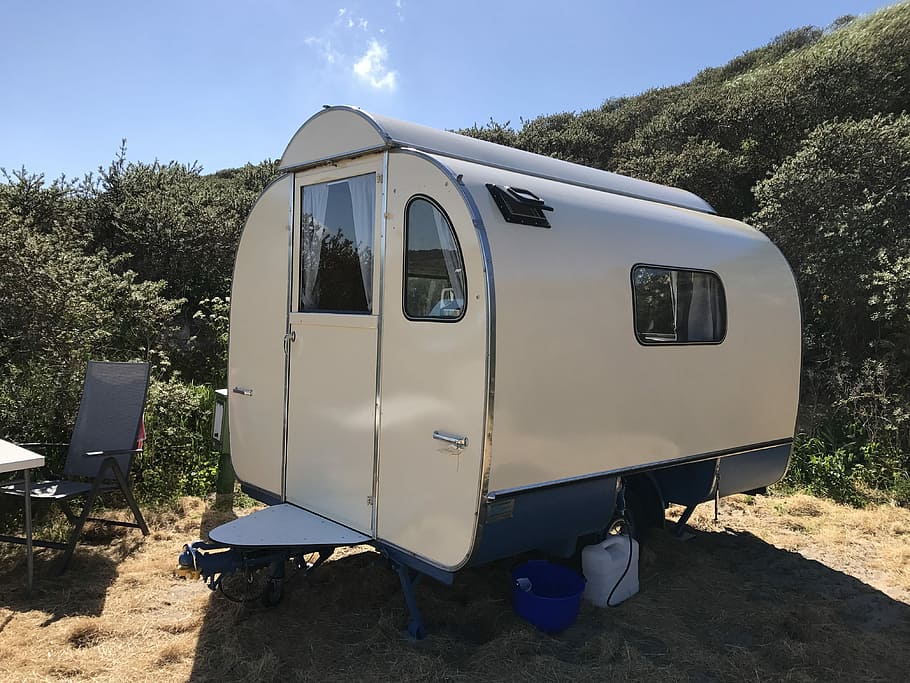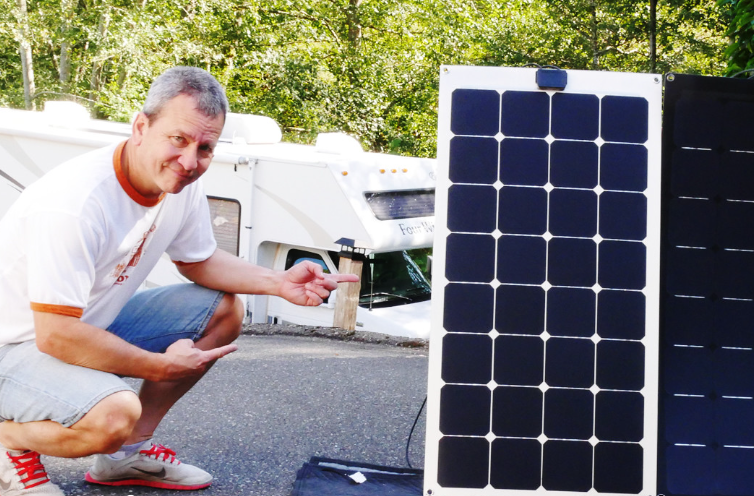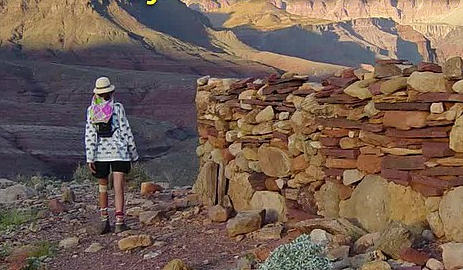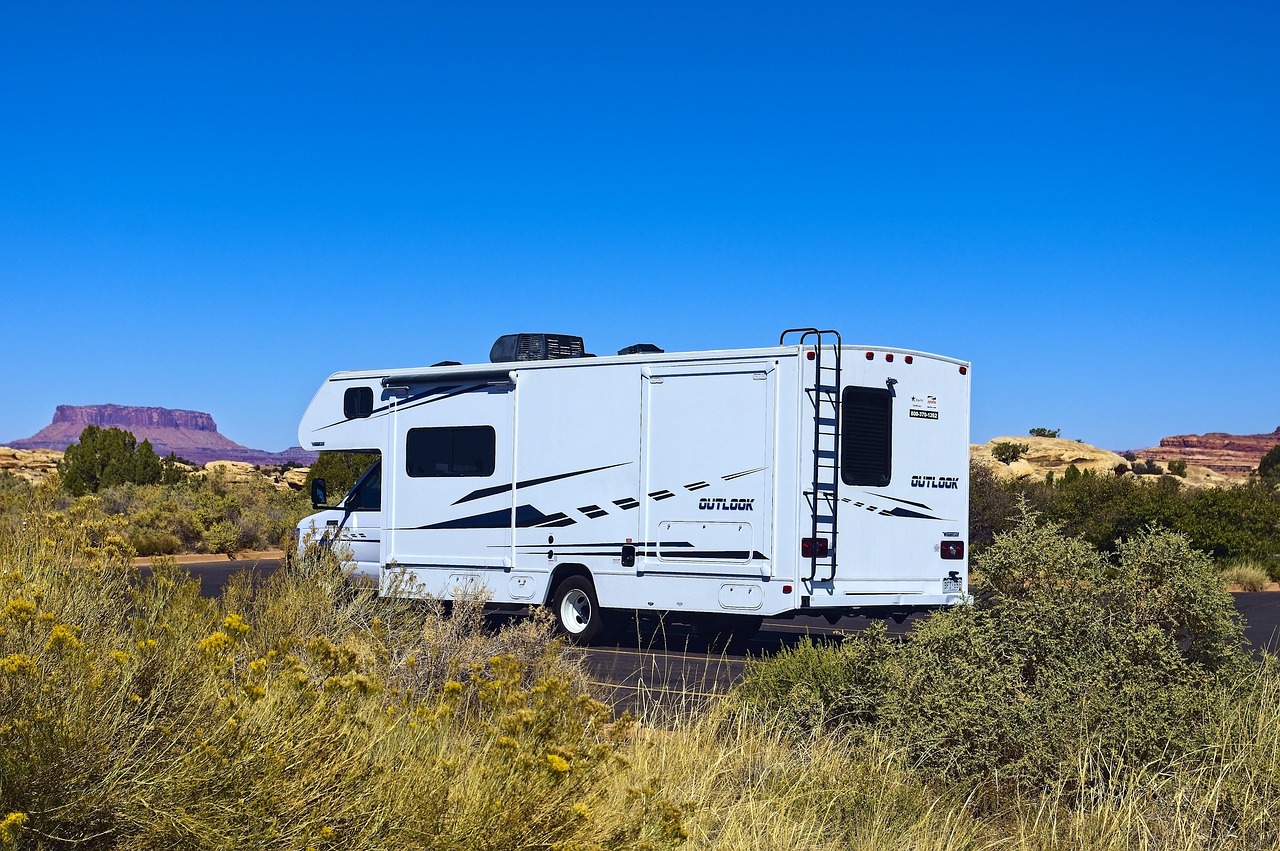Have you ever dreamt of waking up to breathtaking mountain views or calming ocean sounds, all from the comfort of your RV? Boondocking, also known as dry camping or dispersed camping, transforms your RV into a gateway to unforgettable experiences in nature’s embrace. Imagine escaping crowded campgrounds and hefty fees, replacing them with the serenity of secluded locations and the thrill of self-sufficient living.
Beyond the cost savings and privacy, boondocking fosters a deep connection with the environment. By becoming a boondocker, you trade in hookups for resourcefulness. You’ll harness solar power, conserve water, and embrace the principles of Leave No Trace to minimize your footprint and become a responsible steward of the outdoors. This comprehensive guide equips you with all the knowledge and resources to embark on your own boondocking adventure, transforming your RV from a vehicle into a sustainable haven for exploration and adventure.
Environmental and Financial Advantages of Boondocking
Boondocking goes beyond the typical RV experience, prioritizing both eco-friendly practices and budget-conscious travel. Let’s delve into the ways it benefits both you and the environment:
Reduced Environmental Impact: Embrace a sustainable lifestyle by minimizing your reliance on external resources. Utilize solar panels to generate clean energy, meticulously conserve water, and adhere to Leave No Trace principles to ensure minimal disruption to the natural environment.
Cost-Effective Exploration: Ditch the campground fees and enjoy significant financial savings. Boondocking allows you to explore scenic locations for free or at minimal cost, stretching your travel budget further.
Energy Conservation:
Boondocking encourages a mindful approach to energy use. Here are some tips to extend your off-grid capabilities:
- Light it Up Efficiently: Replace traditional bulbs with LED lights, which use significantly less power.
- Unplug the Unused: Get into the habit of unplugging appliances and electronics when not in use to prevent phantom energy drain.
- Prioritize Power: Avoid using high-power appliances like microwaves and hair dryers unless absolutely necessary, especially when not running a generator.
- Solar Solutions: Consider incorporating a portable solar generator to charge USB devices or invest in a solar power system for your RV. This allows you to harness clean, renewable energy to power your adventures.
- Beat the Heat (and the Cold) Naturally: During hot days, utilize awnings and reflective window covers to keep your RV cool. Strategically park your RV in shaded areas whenever possible. At night, open windows and use vent fans for natural air circulation, minimizing reliance on air conditioning.
By following these energy-saving practices, you can become a more responsible steward of the environment and extend the duration of your boondocking adventures.
Adventure and Freedom Await
Boondocking isn’t just about saving money or reducing your footprint; it’s about unlocking a whole new level of adventure. Imagine venturing beyond the confines of traditional campgrounds and into the heart of untouched landscapes. Picture waking up to a symphony of birdsong, surrounded by majestic mountains or glistening coastlines. Boondocking grants you the freedom to explore hidden gems, off-the-beaten-path locations that most travelers miss. This self-sufficient lifestyle fosters a sense of independence and accomplishment. Every challenge overcome, every breathtaking vista discovered becomes a cherished memory, a testament to your adventurous spirit. Embrace the thrill of boondocking and create unforgettable experiences that will forever redefine your RV travels.
Challenges and How to Overcome Them
Boondocking isn’t all sunshine and starry nights. It does come with its own set of challenges that require planning and resourcefulness. Here’s what to expect and how to navigate these hurdles:
- Finding the Perfect Spot: Unlike campgrounds with designated sites, boondocking requires scouting for suitable locations. Public land management websites and apps like iOverlander and Campendium can be your allies in this treasure hunt.
- Resource Management: Off-grid living means managing your water and electricity consumption carefully. Investing in solar panels and conserving water through techniques like showering with a friend (buddy shower) can extend your stay.
- Knowing the Rules: Respect the land and adhere to local regulations. Research restrictions on boondocking duration, fire safety precautions, and waste disposal in your chosen area.
Is it safe to Boondock in an RV?
Boondocking in an RV can be just as safe, or even safer, than tent camping with the right precautions:
- Choose a Safe Location: Make sure camping is permitted and the area can accommodate RVs. Consider arriving during daylight hours and choosing a campsite away from other campers, if possible.
- Prepare Your RV: Bring enough water for your trip and ensure your fresh water tank is full. If you’re using solar panels, have an inverter on hand. WiFi boosters and LTE data devices can also be helpful additions.
- Be Prepared: Familiarize yourself with local fire regulations and follow them strictly. Pack appropriate clothing and gear, and be ready to relocate quickly if necessary.
- Secure Your Belongings: Keep windows covered when not in use, and secure any valuable outdoor equipment. Lock your RV door at night for added security.
- Be a Good Neighbor: Practice responsible wildlife interaction and be mindful of your water usage to avoid impacting the environment or disturbing others.
Equipping Your Boondocking Adventure
Image by RVWithTito.com via flickr
Respecting the Outdoors
Boondocking allows you to experience the beauty of nature firsthand, but it’s important to tread lightly and be mindful of your surroundings. Here are some essential etiquette practices to ensure a positive experience for everyone:
Grand Canyon National Park, CC BY 2.0, via Wikimedia Commons
Leave No Trace
Upholding Leave No Trace principles is paramount. Pack out all trash, including food scraps and hygiene products. Respect wildlife by maintaining a safe distance, avoiding feeding them, and storing food securely. Minimize your impact on the environment by staying on designated trails and avoiding damage to plants and terrain.
Respectful Coexistence
Being a considerate neighbor is key to a harmonious boondocking experience. Maintain a reasonable noise level, especially at night. Utilize solar or battery-powered lighting to minimize light pollution. If using a generator, keep its runtime considerate of others.
Respect for Public and Private Property:
Boondocking opportunities aren’t limited to public lands. With permission, you can sometimes camp overnight in parking lots of businesses like Walmart or Cracker Barrel. However, always ask for permission from the manager beforehand. If they decline, be respectful and find another location. If you do get the okay to stay, limit your visit to one night and leave the place exactly as you found it, taking all your trash with you.
Building Community
The boondocking community thrives on mutual respect and camaraderie. Greet your fellow boondockers with a friendly smile! Offer assistance when needed, and be open to sharing experiences and tips. By following these simple guidelines, you can ensure a memorable and eco-friendly boondocking adventure for yourself and those around you.
Top Apps for Finding Boondocking Locations
Finding the ideal boondocking spot is key to a successful adventure. Luckily, there are fantastic apps to streamline your search and help you discover hidden gems. Here are some of the most popular options:
Image by PickPik
Campendium
Campendium goes beyond just listing locations. Campendium boasts user reviews, photos, and valuable insights from fellow RVers, giving you a well-rounded picture of each boondocking site.
iOverlander
iOverlander is a favorite amongst adventure travelers and RVers alike, iOverlander boasts a global database of boondocking locations, campgrounds, and essential services like water refill stations and dump sites. This versatile app is your one-stop shop for planning your off-grid itinerary, ensuring you have everything you need for a comfortable and fulfilling boondocking experience.
AllStays
AllStays is your one-stop shop for planning any RV adventure, boondocking or otherwise. This app offers a wealth of information, including detailed listings for campgrounds, RV parks, and of course, boondocking locations. Beyond campsites, AllStays helps you locate essential resources like dump stations, propane refills, and even laundry facilities, ensuring a smooth and convenient trip.
ParkAdvisor
ParkAdvisor acts as your comprehensive guide to all things RV camping. This app encompasses a vast database that includes boondocking locations alongside national parks, state parks, and various other camping options. Whether you seek a secluded boondocking adventure or a amenity-rich campground experience, ParkAdvisor helps you discover the perfect campsite to suit your travel style and preferences.
Useful Websites for Boondocking Research
Boondockers Welcome
Boondockers Welcome goes beyond just finding locations; it fosters a unique community experience. This program connects RVers with hospitable private property owners who offer complimentary overnight stays on their land. It’s a fantastic way to discover hidden gems and enjoy the camaraderie of fellow travelers, all while practicing responsible boondocking. There’s a good chance you’ll find unique locations with scenic views or interesting local experiences you wouldn’t encounter at traditional campgrounds.
FreeCampsites.net
FreeCampsites.net leverages the collective knowledge of the RV community to provide a comprehensive directory of budget-friendly camping options. This crowd-sourced platform lists free and low-cost campsites, including boondocking locations on public lands and a variety of off-grid hidden gems. With user reviews, ratings, and photos, FreeCampsites.net empowers you to make informed decisions and discover unique camping spots that perfectly suit your boondocking adventure.
Harvest Hosts
Harvest Hosts is a membership program unlocks a world of unforgettable overnight stays at wineries, farms, breweries, and other interesting locations across North America. For a modest annual fee, Harvest Hosts allows you to park your RV at these scenic locations, often enjoying discounts on their products or complimentary tastings. It’s a fantastic way to combine your love for the outdoors with supporting local businesses and savoring regional flavors, all while experiencing a unique twist on boondocking.
RVwithME
RVwithME connects RVers with a diverse range of private landowners who offer RV campsites on their property. This platform caters to various preferences, including boondocking locations for the off-grid enthusiast and hookup sites with amenities for those seeking a bit more comfort. With RVwithME, you can discover unique campsites like scenic farms, peaceful meadows, or interesting historical sites, all while supporting local landowners.
The Dyrt
The Dyrt is your comprehensive guide to all things camping. This user-friendly platform curates an extensive directory that encompasses campgrounds, RV parks, and of course, boondocking locations across North America. Beyond just listings, The Dyrt enriches your search with valuable user reviews, informative descriptions, and eye-catching photos. This all-in-one resource empowers you to compare options, discover hidden gems, and find the perfect campsite to match your boondocking preferences.
Online RVing and Boondocking Communities
Image by Aljonushka from Pixabay
Escapees RV Club
Escapees RV Club offers a plethora of resources beyond boondocking information. Escapees RV Club provides support, community events, and discounted camping options at member-owned parks across North America. It’s a fantastic option for RVers seeking a comprehensive and supportive RV lifestyle experience.
Fulltime Families
Fulltime Families fosters a welcoming online community for anyone interested in embracing the RV lifestyle, particularly those considering full-time travel. This platform provides a wealth of resources, educational content, and engaging events to support your RV adventures. Connect with like-minded individuals and families, swap travel tips and boondocking experiences, and find encouragement and support in this vibrant online community.
Xscapers
Xscapers provides a thriving online space for working-age RVers to connect, share experiences, and plan their RV adventures. As a subgroup of Escapees RV Club, they offer resources, events, and valuable networking opportunities specifically tailored to individuals embracing the RV lifestyle while balancing work or other commitments. Whether you’re drawn to boondocking escapes, workamping opportunities, or simply seeking a supportive community of fellow RV travelers, Xscapers welcomes you with open arms.
Boondocking Facebook Groups
The thriving boondocking community extends to social media platforms like Facebook. Facebook Groups offer a dynamic space for RVers to connect, share experiences, and learn from each other. Here, you can:
- Exchange stories and tips: Engage in discussions with fellow boondockers, swap travel recommendations, and glean valuable insights from their experiences.
- Ask questions and get help: The group environment fosters knowledge sharing. If you have a question about boondocking etiquette, gear recommendations, or finding a specific location, chances are a helpful member has the answer.
- Discover hidden gems: Many groups focus on specific regions or states, allowing you to discover unique boondocking locations recommended by locals and experienced RVers.
- Stay informed: Stay updated on the latest news and information relevant to boondocking, including changes in regulations or new resources for finding off-grid campsites.
Finding the Perfect Group:
With a vast number of Boondocking Facebook Groups available, it’s important to find ones that align with your interests and preferences. Here are some tips for your search:
- Target your interests: Look for groups specific to your region or preferred boondocking style (e.g., dry camping with families, off-road boondocking with modified RVs).
- Read the descriptions and guidelines: Most groups have descriptions outlining their focus and any rules for participation.
- Join and participate: Once you find a group that seems like a good fit, actively participate in discussions, ask questions, and share your own experiences to become part of the vibrant boondocking community.
Disclaimer: While Facebook Groups offer a wealth of information, it’s crucial to verify the accuracy of advice and recommendations before relying on them. Always double-check regulations and policies with official sources to ensure a safe and enjoyable boondocking adventure.
Tips for a Successful Boondocking Experience
Embarking on a boondocking adventure requires a different approach compared to RV park stays. To ensure a smooth and enjoyable off-grid experience, meticulous planning and preparation are key. Here are some crucial aspects to consider:
Image by Mike Goad from Pixabay
Preparation
Research potential locations thoroughly. Utilize apps, websites, and guidebooks to discover boondocking sites that suit your preferences. Consider factors like accessibility (can your RV navigate the terrain?), amenities (will you have cell service?), restrictions (are generators allowed, is there a fire ban?), and terrain difficulty (are you comfortable with uneven ground?).
Anticipate potential challenges and pack accordingly. Research common boondocking issues and pack tools and supplies to address them, such as a flat tire repair kit, jumper cables, and basic plumbing supplies. A toolkit specific to your RV can also be a lifesaver.
Arrive during daylight, check the weather forecast, and bring fresh water. This will give you ample time to set up camp before nightfall, avoid setting up in bad weather, and ensure you have enough water to last your trip, especially if there are no designated fill stations nearby.
If you’re planning to use a generator, check if the area has designated hours. Many boondocking locations have quiet hours, so be a considerate neighbor and only run your generator during permitted times. You can also consider getting an inverter generator, which is quieter and more portable than traditional models.
Planning
Think about what you’ll be using and consuming each day, and track how much water and battery power you use. This can help you identify your RV’s limitations and make improvements over time. For example, if you find yourself constantly running out of water, you might consider installing a larger freshwater tank or investing in water conservation methods. Likewise, if your battery power dwindles quickly, you might explore solar panel options or adjust your energy consumption habits. By monitoring your usage, you can become a more self-sufficient boondocker and extend the duration of your off-grid adventures.
By following these preparation steps, you’ll be well on your way to a smooth and enjoyable boondocking adventure!
Choosing the Right Boondocking Location
- Consider factors like accessibility (road conditions, RV size limitations), safety (crime rates, wildlife encounters), cellular coverage (essential if you need to stay connected), and proximity to amenities (water refill stations, dump stations, gas stations) when selecting your boondocking spot.
Weather and Climate Considerations
- Research weather patterns and climate conditions at your chosen location. Be prepared for expected weather and pack appropriate clothing and gear. Understanding potential risks associated with seasonal changes, like flash floods or extreme temperatures, allows you to make informed decisions and take necessary precautions.
Maintaining Connectivity while Off-Grid
- For RVers who rely on internet connectivity, research cellular coverage in potential boondocking locations. Invest in signal boosters or satellite internet options if necessary to maintain communication while off-grid. Be aware that connectivity can still be limited in remote areas.
Escape the Ordinary, Embrace the Adventure
Boondocking isn’t just about saving money on campsites; it’s about a deeper connection with nature and a chance to escape the ordinary. Imagine waking up to a breathtaking vista, the tranquility of the wilderness surrounding you. With careful planning, the right resources, and a commitment to responsible practices, boondocking can unlock a world of unforgettable adventures. So, gear up your RV, embrace the spirit of exploration, and experience the magic of off-grid living underneath a canopy of stars.
Resources
- Leave No Trace Center for Outdoor Ethics: https://lnt.org/
- This organization promotes responsible outdoor recreation and the Leave No Trace principles.
- Campendium: https://www.campendium.com/
- A comprehensive resource for finding boondocking sites, with user reviews and photos.
- iOverlander: http://www.ioverlander.com/
- A popular app among overlanders and RVers, offering a global database of boondocking sites, campgrounds, and essential services.
- AllStays: https://www.allstays.com/
- Provides detailed information on campgrounds, RV parks, and boondocking locations, as well as resources like dump stations and propane refills.
- Escapees RV Club: https://www.escapees.com/
- Offers resources, support, and events for RVers, including information on boondocking and discounted camping options.

